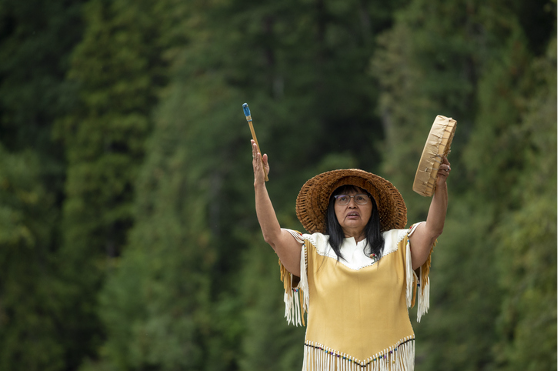Module 4: Related Practice Issues: Trauma-Informed Care, Supporting Strength – based and Resiliency Approaches, Primordial Prevention
Wholistic Approach to Health
It is well documented that Indigenous peoples have their own health and wellness systems linked to their own diverse worldviews, knowledge and beliefs. A common concept among diverse Indigenous belief systems is that of wholism. Indigenous worldviews are described as wholistic and integrative and they emphasize connection, harmony and fundamental relationships between all things. Further, that their physical, emotional, mental and spiritual well-being is interdependent with the world around them and connected to both past and future generations (Turpel-Lafond, 2020).

The Indigenous Primary Health Care Council describes a ‘Model of Wholistic Health and Wellbeing’ that promotes ‘high quality care provision’. This model is based on a population needs approach to health care planning and delivery for Indigenous populations. The model incorporates physical, mental, emotional and spiritual elements of well-being and it is the belief that all elements must operate in harmony. It is also described as being inclusive of personal and collective efforts towards achieving balance and harmony. It is linked to spiritual well-being and is directly connected to various Indigenous places, land, language, and culture. Traditional Knowledge and healing practices are noted to support spiritual well-being and the outward manifestation of health in intellectual, physical and emotional dimensions of being.
 Culture is believed to be treatment and healing and the model is seen to solidly implant as strong self-identity that fosters self-determination and advances positive health outcomes (Indigenous Primary Health Care Council, 2022).
Culture is believed to be treatment and healing and the model is seen to solidly implant as strong self-identity that fosters self-determination and advances positive health outcomes (Indigenous Primary Health Care Council, 2022).
** For more information about the Model of Wholistic Health and Wellbeing see this link: https://iphcc.ca/post_resources/indigenous-health-systems-transformation-booklet/

Absolon discusses the concept of wholistic Indigenous theory and makes the important point that Indigenous worldviews and the way Indigenous peoples relate to the world around them are the foundation for the principle of ‘we are all related’. Indigenous theory is described as ‘being rooted intimately within Indigenous epistemologies, worldviews, cultures and traditions’. Further, that it is multi-layered and encompasses the spiritual, emotional, mental and physical elements of being. The past, present and future are also acknowledged; a practice that supports a recognition of seven generations past and the seven generations into the future.
Finally, Indigenous theory is noted to be earth-based and connected to teachings of the land, sun, water, sky and of all Creation. It integrates natural teachers and elements of the earth into its methodologies of practice. Indigenous belief systems are described as a framework that serves to decolonize and Indigenize thoughts and actions into active healing processes (Absolon, 2010). In the context of CVD/s self-management of care, this is an important concept and holds potential to reinforce personal agency.
Turpel-Lafond, M. E. (2020). In Plain Sight Addressing Indigenous-specific Racism and Discrimination in B.C. Health Care (pp. 1–74). https://engage.gov.bc.ca/app/uploads/sites/613/2020/11/In-Plain-Sight-Summary-Report.pdf
Indigenous Primary Health Care Council. (2022). Indigenous Health Systems Transformation (pp. 1–21). https://iphcc.ca/wp-content/uploads/ninja-forms/2/Indigenous-HST_Booklet.pdf
Absolon, K. (2010). Indigenous Wholistic Theory: A Knowledge Set for Practice. 5(2).
